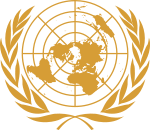Chapter X of the United Nations Charter
- Chapter X of the United Nations Charter
-
Chapter X of the United Nations Charter deals with the UN Economic and Social Council. Originally, Article 61 provided that ECOSOC would consist of 27 members, but in 1965 the Charter was amended to expand ECOSOC to 54 members. ECOSOC's members are elected by the UN General Assembly to staggered three-year terms, and are eligible for immediate re-election. This enables countries like the United States to be de facto permanent members. Article 62 empowers ECOSOC to "make or initiate studies and reports with respect to international economic, social, cultural, educational, health, and related matters" and to make recommendations "promoting respect for, and observance of, human rights and fundamental freedoms for all." It can prepare draft conventions and call international conferences – these have included, for instance, the 1961 New York conference that drafted the Single Convention on Narcotic Drugs. Article 64 gives ECOSOC concurrent power, along with the UN General Assembly, to receive reports from specialized agencies, provided that the subject matter falls within ECOSOC's purview. Article 68 empowers it to "set up commissions in economic and social fields and for the promotion of human rights."
Article 71
Article 71 forms the basis for granting nongovernmental organizations Consultative Status. There were representatives of 1,200 voluntary organizations present at the founding conference of the United Nations in San Francisco in 1945, and this article provided a mechanism for continued involvement.[1]
References
Wikimedia Foundation.
2010.
Look at other dictionaries:
Chapter VII of the United Nations Charter — sets out the UN Security Council s powers to maintain peace. It allows the Council to determine the existence of any threat to the peace, breach of the peace, or act of aggression and to take military and nonmilitary action to restore… … Wikipedia
Chapter I of the United Nations Charter — lays out the purposes and principles of the United Nations organization. These principles include the equality and self determination of nations and the obligation of member countries to obey the Charter, to cooperate with the UN Security Council … Wikipedia
Chapter IV of the United Nations Charter — contains the Charter s provisions dealing with the UN General Assembly, specifically its composition, functions, powers, voting, and procedures. Contents 1 Primacy of the General Assembly 2 Articles 10, 11, 12, 13, 14, 15, and 16 3 Article 17 … Wikipedia
Chapter VI of the United Nations Charter — deals with peaceful settlement of disputes. It requires countries with disputes that could lead to war to first of all try to seek solutions through peaceful methods such as negotiation, enquiry, mediation, conciliation, arbitration, judicial… … Wikipedia
Chapter II of the United Nations Charter — deals with membership of the United Nations organization. Membership is open to the original signatories and all other peace loving states which accept the obligations contained in the present Charter and, in the judgment of the Organization, are … Wikipedia
Chapter III of the United Nations Charter — summarizes the principal organs of the United Nations. They are listed in the same order as the chapters detailing their composition, functions, and powers appear in the Charter. The placement of the General Assembly first in the list probably is … Wikipedia
Chapter IX of the United Nations Charter — deals with international economic and social cooperation. Article 55 reflects the philosophy of the UN that efforts should be made to impact the root causes of war: With a view to the creation of conditions of stability and well being which are… … Wikipedia
Chapter XVI of the United Nations Charter — contains miscellaneous provisions prohibiting secret treaties, establishing the UN Charter as supreme over any other treaties, and providing for privileges and immunities of UN officials and representatives. Contents 1 Article 102 2 Article 103 3 … Wikipedia
Chapter V of the United Nations Charter — contains provisions establishing the United Nations Security Council. Article 23 establishes the composition of the Security Council, with five permanent members (the Republic of China, France, the Soviet Union, the United Kingdom, and the United … Wikipedia
Chapter VIII of the United Nations Charter — deals with regional arrangements. It authorizes regional organizations (such as NATO) and even requires attempts to resolve disputes through such agencies (if available) prior to intervention by the UN Security Council. However, Article 53… … Wikipedia
Chapter XV of the United Nations Charter — deals with the UN Secretariat. It designates the UN Secretary General as the chief administrative officer of the organization, which includes the staff of ECOSOC, the Trusteeship Council, and other organs. Similarly to how the US Constitution… … Wikipedia

